Politics
/ArcaMax

No shutdown: Senate clears stopgap bill, sending it to Biden's desk
WASHINGTON — The Senate cleared a stopgap funding extension early Saturday shortly after a midnight deadline, staving off a partial government shutdown and ending days of gridlock over a package whose contents seemed to change by the hour.
Eager to head out of town for the Christmas recess, the Senate won unanimous consent to speed up the ...Read more
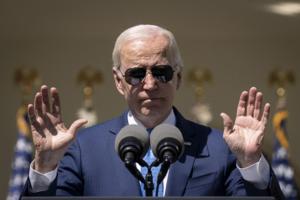
Biden gets record 235th federal judge confirmed in waning days
WASHINGTON — President Joe Biden set a new record for federal judicial confirmations in a single term, when Serena Murillo became his 235th life-tenured federal judge confirmed by the U.S. Senate as lawmakers worked into the night ahead of a holiday break.
The confirmation on Friday night means that approximately one quarter of all active ...Read more

Latest stopgap funding bill, sans debt limit, passes House
WASHINGTON — The House finally passed a stopgap funding extension Friday, hours before the midnight deadline to avert a partial government shutdown, after Democrats moved off their opposition to anything but the larger bipartisan package that President-elect Donald Trump and Elon Musk killed earlier this week.
The 366-34 vote was enough to ...Read more

Missouri judge blocks some, not all, abortion restrictions. What that means for restoring access
KANSAS CITY, Mo. — A Missouri judge on Friday blocked a series of long-standing restrictions on abortion, but kept in place a licensing requirement that could delay providers from immediately restoring access to the procedure.
The decision from Jackson County Circuit Court Judge Jerri Zhang came after voters last month overturned the state’...Read more

House votes to approve stripped-down funding bill to avoid shutdown
WASHINGTON — The U.S. House voted late Friday to approve a package funding the government through mid-March and providing emergency aid for homeowners, businesses and farmers affected by recent natural disasters.
Democrats joined some Republicans to give 366 votes for passage to the temporary funding bill. Thirty four Republicans voted ...Read more

House plans vote on stripped down funding bill to avoid shutdown
WASHINGTON — The U.S. House is expected to vote late Friday on a package funding the government through mid-March and providing emergency aid for homeowners, businesses and farmers affected by recent natural disasters.
After two earlier failed attempts, Speaker Mike Johnson offered a “Plan C” to avoid a government shutdown scheduled to ...Read more

Government shutdown looms as GOP works on spending 'Plan C'
A federal government shutdown was looming Friday as congressional Republicans sought to come up with a new stopgap spending plan after a proposal backed by President-elect Donald Trump failed badly.
House Speaker Mike Johnson told reporters that GOP leaders have agreed on a so-called Plan C after 38 Republicans voted against a Trump-endorsed ...Read more

Baltimore mayor, Maryland governor cautious toward potential Trump deportations as regional leaders take different paths
BALTIMORE — Exactly one month before Donald Trump is scheduled to retake the White House, Maryland leaders are taking a cautious approach toward his signature call to deport people who are in the country illegally.
In Baltimore, Mayor Brandon Scott — the city’s first mayor to win reelection in two decades — has touted his role in ...Read more

With government shutdown looming, what happens to bird flu surveillance?
As government agencies prepare for a potential shutdown, questions about the government’s response to a potentially burgeoning H5N1 bird flu pandemic are top of mind for many public health and agriculture officials.
Inquiries to the U.S. Department of Agriculture, which oversees the dairy industry and the new National Milk Testing Strategy �...Read more

Why Trump's boast of newly found friends could prove fleeting
Donald Trump’s first term was all about the fight — with Democrats, the media and, at times, even fellow Republicans.
But notwithstanding his role in torpedoing a recent stopgap spending deal, the times appear to be changing, according to the president-elect.
“I did have dinner with Tim Cook. I had dinner with almost all of them, and the...Read more
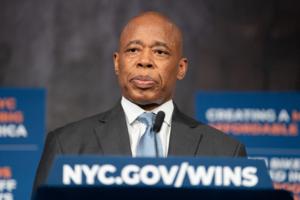
Mayor Adams' campaign faces potential 'breach of certification' finding over federal corruption case
NEW YORK — Citing Mayor Eric Adams’ federal corruption indictment, the city’s election finance watchdog agency is weighing a possible finding that the mayor’s political campaign in “breach of certification” — the panel’s most severe penalty that has the potential to cost his team as much as $10 million, the Daily News has learned...Read more

Government shutdown looms as GOP works on spending 'Plan C'
A federal government shutdown was looming Friday as congressional Republicans sought to come up with a new stopgap spending plan after a proposal backed by President-elect Trump failed badly.
House Speaker Mike Johnson told reporters that GOP leaders were crafting a so-called Plan C after 38 Republicans voted against a Trump-endorsed proposal ...Read more

Government shutdown looms as GOP works on spending 'Plan C'
A federal government shutdown was looming Friday as congressional Republicans sought to come up with a new stopgap spending plan after a proposal backed by President-elect Trump failed badly.
House Speaker Mike Johnson told reporters that GOP leaders were crafting a so-called Plan C after 38 Republicans voted against a Trump-endorsed proposal ...Read more
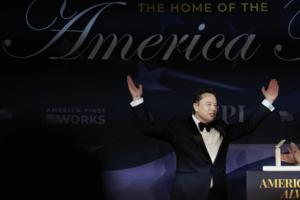
'Everybody wants to be my friend': Trump marvels at tech titan attention
The most powerful leaders in the tech industry are trying out a new playbook to engage Donald Trump, who has been historically opposed to their dominance: in-person dining.
A steady stream of some of the biggest names in technology — Meta Platforms Inc.’s Mark Zuckerberg, Google co-founder Sergey Brin and Amazon.com Inc.’s Jeff Bezos — ...Read more

Trump's mass deportation pledges are already a Caribbean reality
It was about 3 a.m. when immigration police began breaking down doors and dragging people away from a remote sugarcane cutters’ camp in the eastern Dominican Republic.
When the sun rose that morning, 17-year-old Arturo Mejia found himself crammed into a paddy wagon along with dozens of grizzled farm hands, pregnant women and children. They ...Read more

What a federal government shutdown could mean for air travel
While a federal government shutdown would halt some government operations, air traffic controllers and security screeners at airports would be deemed essential employees and would continue working to keep flights and passengers flowing.
A federal shutdown could take effect Saturday if lawmakers don’t reach a deal to keep government funded.
...Read more
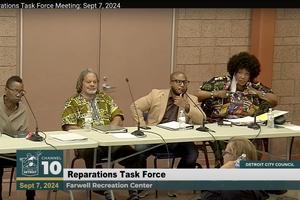
Detroit’s reparations task force now has until 2025 to make its report, but going slow with this challenging work may not be a bad thing
The work of crafting reparations at the municipal level is fierce.
Detroiters know. In November 2021, residents voted to create a reparations committee that would make recommendations for housing and economic development programs to address historical discrimination against Black residents.
Three years have passed – and ...Read more

Climate of fear is driving local officials to quit – new study from California finds threats, abuse rampant
Threats and harassment are pushing some politicians out of office, scaring off some would-be candidates and even compelling some elected officials to change their vote.
Those are some of the conclusions of a new study I led on political violence in Southern California.
Rising threats against public officials is a national ...Read more
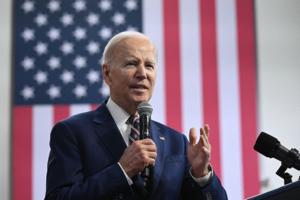
History will be kinder to Joe Biden than the pollsters
Now that pollsters are declaring President Joe Biden a “failure,” historians will reckon with too many economic signals rendering the prevailing narrative little more than media noise.
From the American Rescue Plan Act of 2021 that ushered in the longest period of unemployment below 4% since the 1960s to the Infrastructure Investment and ...Read more

Trump is guilty and not immune -- His Stormy Daniels hush money conviction remains
Even a terribly wrong-headed decision by the U.S. Supreme Court on a president’s post-White House criminal immunity can’t undo Donald Trump’s 34 felony convictions correctly ruled Acting Manhattan state Supreme Court Justice Juan Merchan.
You remember Merchan, who oversaw Trump’s Stormy Daniels hush money trial downtown in the spring ...Read more
Popular Stories
- What actually gets shut down when the government stops spending
- Congress races to avert government shutdown but Trump, Musk threaten to derail compromise
- Trump is guilty and not immune -- His Stormy Daniels hush money conviction remains
- Biden to visit Pope Francis one last time during presidency
- History will be kinder to Joe Biden than the pollsters


























































